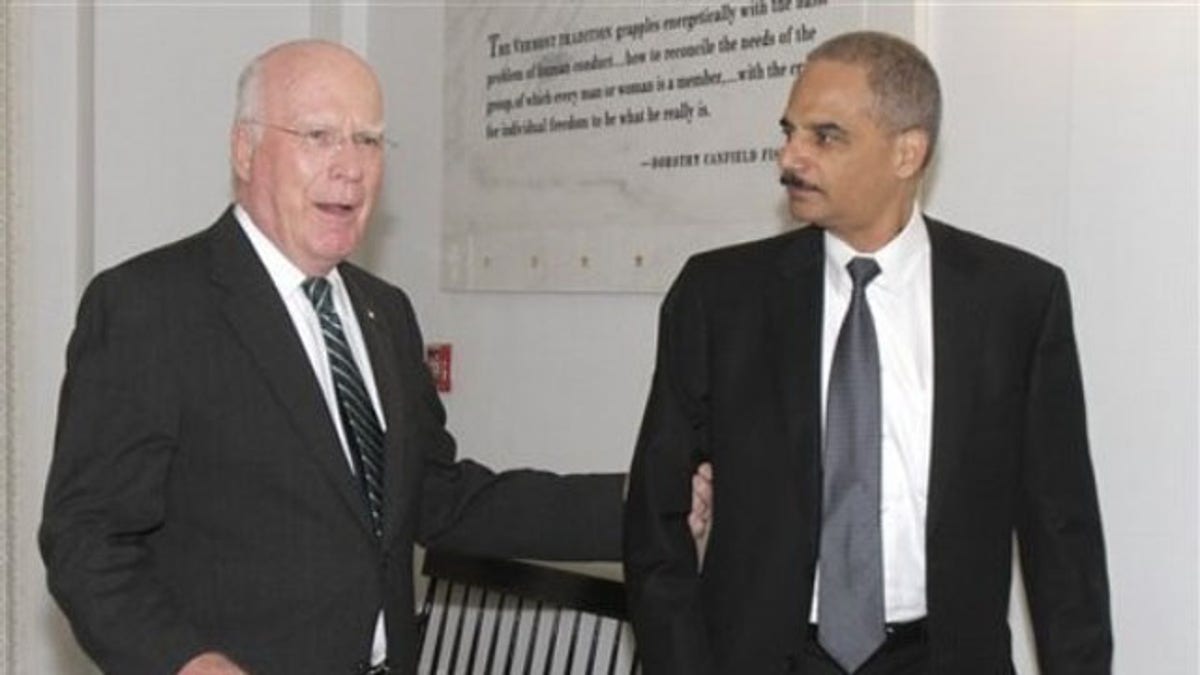
Attorney General Eric Holder, right, is shown with Sen. Patrick Leahy in Montpelier, Vt., Sept. 10. (AP Photo)
Senate sponsors have eased off a bill aimed at cracking down on online piracy after an outcry from Internet engineers who say the proposal would effectively censor the Web.
The Combating Online Infringement and Counterfeits Act still would contain some highly controversial provisions, but senators proposed an amendment Wednesday to strip from the bill language that allowed the Justice Department to publish a blacklist of websites "dedicated to infringing activities."
Under the original bill, the Justice Department would be able to green light Internet service providers to go after those sites by providing them legal immunity.
The amendment also would lessen requirements on service providers to clean up their networks. But the bill would still give the attorney general broad new powers to seek court approval to shut down websites deemed dedicated to counterfeit material.
Internet advocates have warned that the change in law would open a door for a handful of people in the federal government to wantonly power off entire websites that may be operating legally under current law. Though senators suggest the bill would save jobs by cracking down on piracy, critics say it will hurt the economy by threatening fledgling companies whenever copyrighted material shows up on their sites.
It's unclear whether the amendment will temper those concerns. The Senate Judiciary Committee was originally planning to call up the bill for a possible vote Thursday, but postponed that meeting as the chamber adjourned for the election.
Peter Eckersley, senior staff technologist at the Electronic Frontier Foundation, said he and other civil rights advocates were caught off guard when senators introduced the bill last Monday and have scrambled to voice their concerns to Congress.
Eighty-seven engineers who played a role in the creation of the Internet sent a letter this week to the Judiciary Committee urging it to sideline the bill.
"All censorship schemes impact speech beyond the category they were intended to restrict, but this bill will be particularly egregious in that regard because it causes entire domains to vanish from the Web, not just infringing pages or files. Worse, an incredible range of useful, law-abiding sites can be blacklisted under this bill," they wrote.
But the bill's co-sponsors and supporters say it provides a critical tool to go after the worst-of-the-worst in the world of online piracy.
"No one would dispute that online infringement and counterfeiting of American intellectual property drains the American economy and costs American jobs," Senate Judiciary Committee Chairman Patrick Leahy, D-Vt., who introduced the bill, said in a written statement. "No one would defend websites, primarily based overseas, that are dedicated to infringing activities. We continue (to) welcome input from everyone on the best way to attack the problem, but ignoring the problem, or saying it is too complicated, can no longer be an option."
The bill has broad bipartisan support on the committee, including that of Utah Republican Sen. Orrin Hatch. Thirteen of the 16 committee members are co-sponsors, giving the bill a strong chance of passing should it come up for a vote after the election.











































